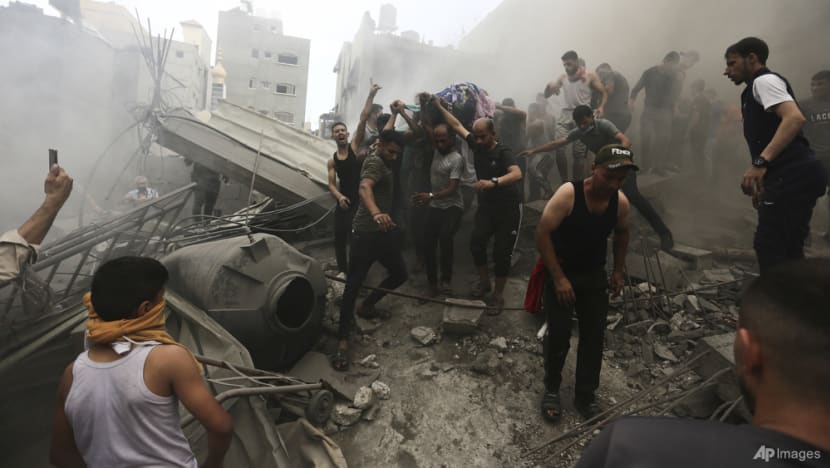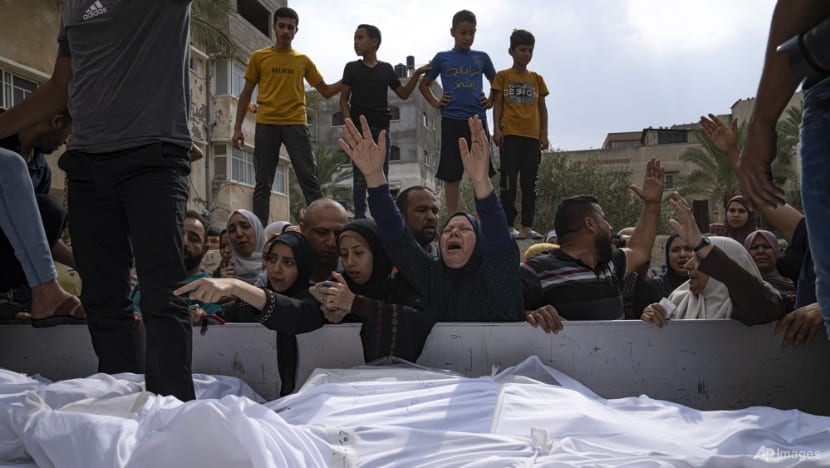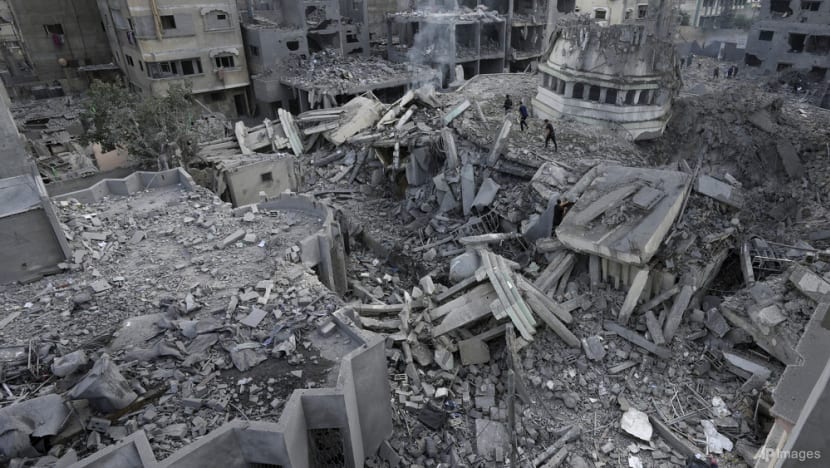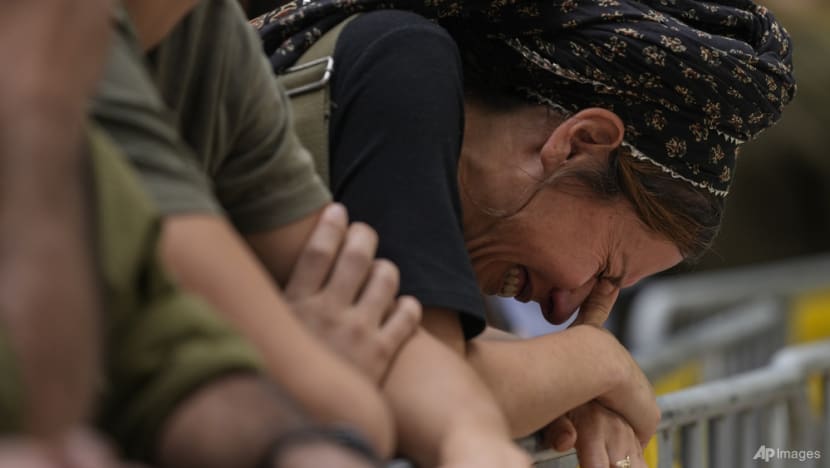Respect humanitarian laws in Israel-Hamas conflict, avoid targeting civilians and aid workers: UN
“It cannot target innocent civilians, women, children and men who have nothing to do with this war,” said a UN official on the actions of parties on both sides of the conflict.

FILE - Palestinians remove a dead body from the rubble of a building after an Israeli airstrike Jebaliya refugee camp, Gaza Strip, Monday, Oct. 9, 2023. As Israeli warplanes pummel Gaza to avenge the Hamas attack, Palestinians say the military has largely unleashed its fury on civilians. (AP Photo/Ramez Mahmoud, File)
Human rights defenders have reiterated calls for all parties in the ongoing conflict in Israel and the Gaza Strip to respect humanitarian laws and avoid making civilians and aid workers targets.
This comes amid mounting concerns over the worsening humanitarian crisis in Gaza.
Israel has been pounding the Gaza Strip for days, since a surprise attack by Hamas militants on Saturday (Oct 7) killed some 1,200 people.
The retaliatory strikes by Israel, which has formally declared war on Hamas, have killed more than 1,100 people and left entire neighbourhoods in shambles.
Ms Ravina Shamdasani, chief spokesperson at the United Nations Human Rights Office, said both sides have to abide by international humanitarian laws, which are crafted “to ensure that even in the conduct of hostilities, there are certain actions that are entirely prohibited”.
“The civilian population must be spared,” she told CNA’s Asia Tonight on Wednesday.
“All steps must be taken to ensure that they are not killed or injured, that essential civilian infrastructure is not hit and certainly not targeted. These are laws that were exactly drafted and crafted for such situations.”
HUMANITARIAN LAWS ARE ‘LAWS OF WAR’
Non-compliance by one party in the conflict does not excuse the other party, Ms Shamdasani noted.
“There is an obligation on all sides no matter what, in any circumstance, to respect international humanitarian law,” she said.
Observers stressed that careful calculations need to be taken in military operations, so that innocent parties are not affected.

“It cannot target innocent civilians, women, children and men who have nothing to do with this war. That should be a fundamental principle in humanity that we can all agree on,” said Ms Shamdasani.
“These are the laws of war. They're not the kind of naive, idealistic constructions for world peace. These are laws that apply specifically in times of war, to prevent catastrophe for civilians.”
She noted that rampant violations of international humanitarian law do not lead to long-term peace.
“There are specific legitimate military targets that can be hit. Whenever you are assessing whether or not a strike is legal, you need to assess whether it's going to have a disproportionate impact on civilians,” she added.
“Otherwise, the strike is illegal and it amounts to a war crime. These calculations are very important to make in any attempt at targeting military facilities on the other side.”

LIVING IN TERROR
Israel has also imposed a total siege, cutting off water, food and energy supplies for 2.3 million people in the Gaza Strip.
The crowded enclave's only power plant also shut down on Wednesday after running out of fuel.
‘The declaration by the Israelis of a complete siege on Gaza could amount to collective punishment, which is very clearly prohibited under international humanitarian law,” said Ms Shamdasani.
“We are looking at a really difficult situation for the people on the ground.”
Dr Jason Hart, professor of humanitarianism and development at the University of Bath, agreed, describing the denial of access to water, food and basic supplies as a “severe violation of international law”.
“I think we need to see, very quickly, a turnaround in the actions and the speech of political leaders, certainly in Europe and North America, who have thrown their lot in entirely with Israel offering unconditional support, overlooking the atrocities now being committed against civilians in Gaza and actions that constitute war crimes,” he told CNA’s Asia Now on Wednesday.
“So they need to take a much more balanced approach to start to operate like honest brokers, and to push for an immediate ceasefire and cessation of hostilities from all sides.”
As of Wednesday, there are more than 263,000 people displaced across Gaza, according to the UN.
Humanitarian organisations operating in Gaza have been trying to accommodate the displaced.
UN schools, for instance, have been opened up as emergency accommodation, but these have also been hit.
“People are terrorised, people have nowhere to flee to. There isn't a safe space anywhere in Gaza that people can go to,” said Dr Hart.
He called the situation horrific, as civilian infrastructure is destroyed systematically, with schools hit and hospitals overrun.
“There needs to be a proper response from the international community to call it out and to insist that Israel steps back and starts to observe international law,” said Dr Hart.

“Without that, then our leaders have no credibility when it comes to talking about human rights and international law, if they're not willing to step up here when we can see very, very clearly how human rights are being violated systematically.”
IS A ‘HUMANITARIAN CORRIDOR’ LIKELY?
Israel, which withdrew troops from Gaza in 2005 after 38 years of occupation, is now preparing for a possible ground offensive in the densely-populated enclave, which is tightly controlled by Hamas.
Already, it has amassed forces, tanks and other heavy equipment around Gaza.
Since Hamas seized power there in 2007, Israel has kept it under blockade, creating intolerable conditions for its inhabitants.
“The humanitarian situation for the people of Gaza was dire and very difficult even before Saturday,” said Ms Shamdasani.
“We are looking at a very difficult situation. We're calling on the Israeli authorities to refrain from any kind of collective punishment on the people of Gaza.”
UN Secretary-General Antonio Guterres on Monday expressed his fears of a further deterioration in the humanitarian situation and appealed to the international community to mobilise immediate support.
There have been calls for a “humanitarian corridor” to allow a safe passage for civilians and goods essential for survival.
But some observers do not think a humanitarian corridor is likely at this point.
“The prospects are devastating and with the invasion of ground forces, if that indeed happens, the killing will just get magnified 10 times over this,” said Dr Hart.
“People who desire peace and the rights of all to live with dignity and respect should be calling out Israel, demanding that it steps back and observes international law.
“And of course, the same applies absolutely to Hamas, and anybody on the Palestinian side that also engages in the killing, the maiming and the destruction of civilians and civilian life.”
Ms Shamdasani added: “The violence needs to stop. People need to come to the negotiating table, and all attempts at incitement to hatred and violence need to cease.
“This is a time for cooler heads, for the lowering of temperatures, ultimately for the security and human rights of people on both sides. A further escalation will serve no one.”















